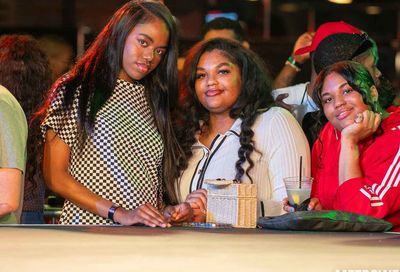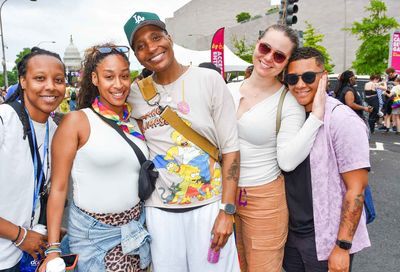Prince’s “Lovesexy” album revisited: 25 years later
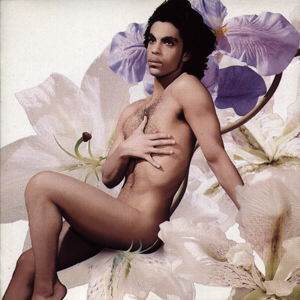
Prince should have been riding high towards the end of 1987. He had ended his association with backing band The Revolution the previous year, immersed himself in the studio, and the resulting double album – “Sign o’ The Times” – was universally hailed by critics as a triumph. It was also a commercial success, yielding three Top 10 hits in America: the stark, socially-conscious title track, the funky duet with Sheena Easton “U Got the Look”, and the searing guitar-rocker “I Could Never Take The Place of Your Man.” “Sign o’ The Times” even earned a nomination for an Album of the Year Grammy. Prince and his band had enjoyed a successful summer tour in Europe in support of the album, and in America he released an acclaimed concert film in select theaters. In early December 1987 he was set to drop an underground-type funk album that was to appear mysteriously all in black, with no credits or label. Dubbed “The Black Album,” the project was generating significant buzz.
Then suddenly, as so often has happened during the course of Prince’s career, plans changed. Nobody but Prince himself seems to know the exact scenario by which “The Black Album” was cancelled, but he ordered Warner Brothers to halt the release at the very last minute and destroy all the copies already printed (some survived, and the album was widely bootlegged until its official release 6 years later as part of his deal to escape his Warner Brothers’ contract. By the time of its official release, it had been so widely bootlegged, and it sounded so dated, that it was met largely with indifference, limping to a peak of #47 on the Billboard Album Charts.)
Instead of the dark, intensely sexual funk of “The Black Album,” at the end of ’87 and into early ’88 Prince recorded an entirely different album. Some say a spiritual awakening caused him to change course and cancel the release; some say it was a bad experience with ecstasy that prompted the change of heart. Perhaps he realized that “The Black Album” was really just a subpar collection of outtakes and throwaways, that there was zero chance it would live up to the hype, and that an abrupt withdrawal with no explanation would just add to the mystique for his next project. Whatever the reason, he retreated to the studio in late 1987 and quickly recorded an album that was in most respects the polar opposite of “The Black Album” – and ended up being a far superior record by any measure. Largely recorded on his own (apart from Sheila E. on drums, a horn section and a host of background vocalists, including the late, great, Boni Boyer), “Lovesexy” was all light, colors and exuberance whereas “The Black Album” had been sparse and forbidding. But while it was upbeat for certain, it was also – to put it mildly – a bit out of the ordinary. Upon its release in May, 1988, “Lovesexy” immediately became viewed as one of the more perplexing albums by a mercurial genius that had already been bewildering fans for years.
First was the album’s cover. Evidently meant to represent a rebirth, “Lovesexy” features Prince completely nude, nestled among day-glo flowers, his knee strategically positioned to hide those Princely attributes that obviously couldn’t be displayed on a Sam Goody or Tower Records end-cap. Then there was the title – after all, what exactly is a “Lovesexy”? Then there was his notion, just as CDs were becoming the dominant consumer format, that the album should be presented as one long 46-minute track. In other words, much to the endless chagrin of fans and DJs, it was impossible to skip from song to song on the CD. The suits at Warner Brothers must have been completely apoplectic.
Fortunately for them, they had a strong first single to ride toward the album’s release. “Alphabet St.” is a colorful little gem with an innovative vocal arrangement that quickly charmed its way into the US Top 10. Based on a simple blues pattern and built over a funky drum machine loop, a wicked slapped bass line, and an almost rockabilly guitar part, “Alphabet St.” was a strong lead-off single that gave some much-needed momentum to the project. (And the video, in a shrewd bit of myth-making, includes the “hidden” message “Don’t buy the Black Album”.) The single edit cuts off at only 2 ½ minutes, but the album version – which was frequently played on the radio – is close to 6 minutes and features a nifty rap vocal performed by Cat Glover, a dancer who had been featured prominently in the “Sign o’ The Times” concert film. The single did well enough to allow “Lovesexy” to debut atop the UK album charts, his first #1 album there. The album also did excellent business throughout Europe.
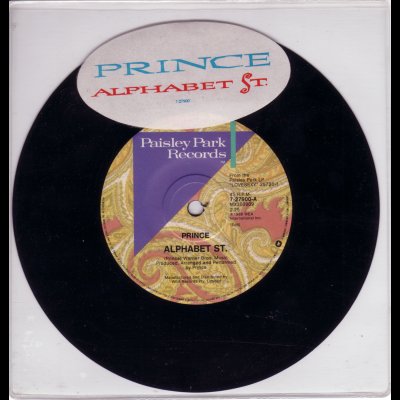
Alas, as far as commercial fortunes go, that was the end of the good news. American audiences and retailers, perhaps in part because of the nude cover, shied away from the album. It stalled at #11 on the Billboard Top 200 album charts, becoming the first Prince album to miss the Top 10 in the US since 1981’s “Controversy” LP. The album’s subsequent singles, “Glam Slam” and “I Wish U Heaven,” became minor hits in the UK but were largely ignored by US radio stations and MTV, and missed the American pop charts entirely – something that hadn’t happened since Prince became a major star with the “1999” and “Purple Rain” albums. His commercial fortunes had changed, and he had bet everything on an album that seemed impossible for Warner Brothers to market to hesitant American audiences.
And yet… the album itself quickly became a favorite of die-hard fans, and critics – while somewhat perplexed – were also generally intrigued. “Lovesexy” is brimming with creativity, and certainly sounded like nothing else on the market at the time (or since, for that matter). It’s bold and brash, colorful and exuberant. A collection of 9 tracks that are largely funky and heavily rhythmic, adorned (some would argue overburdened) with complex arrangements that are often as unpredictable as they are innovative, It’s an album that defies easy categorization. “Lovesexy” is seen as the epitome of Prince’s genius to some, while others view it as an example of his overweening pride and irredeemable self-indulgence.
The central conceit of the album – a battle between God (good) and evil (the Devil, personified as “Spooky Electric”), which largely seems to be an internal struggle – is introduced early on in the record. “Lovesexy” as a concept is never really made clear, but it seems to be a state of spiritual well-being that merges love of God and connection with humanity via sexuality. Fortunately the album is good enough that the listener need not worry about trying to untangle Prince’s typically inscrutable sexual/spiritual philosophies. It’s merely a framework for a collection of songs that stands today as arguably the most fascinating of his career. For all its enigmatic qualities and the strange sideshow that led to its creation, “Lovesexy” is one of Prince’s career high watermarks, a landmark album that displays one of our greatest artists at the very peak of his creative powers. 25 years since its release, it sounds better and more exciting than ever.
The album opens with “Eye No,” a frenetic, joyfully spiritual dance track with a structure similar to the call-and-response gospel numbers Prince must have been familiar with growing up in church. A reworking of an older unreleased track called “The Ball,” “Eye No,” with its thundering bass, rapid-fire horn blasts and euphoric vocal arrangement, is an explosive opening track. It sounds busy and unorganized at first, but repeated listens reveal its ingenious structure. “Eye No” is a song that straddles so many genres and is so distinctly Prince that it’s impossible to imagine any other artist writing it. It leads right into first single “Alphabet St.”, which sounds even better within the context of the full album than it does as a single, its funky stop-start rhythm combining with the opening track for 10+ minutes of unbridled, euphoric funk/pop. Not a bad one-two punch to start an album.
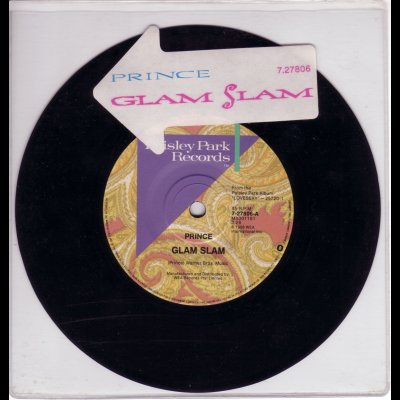 Track 3 is “Glam Slam,” which may have worked as the second single had Prince’s “cool” factor – indisputable during the “1999” and “Purple Rain” era – not been so diminished by the album’s controversial cover and by years of somewhat bizarre behavior. “Glam Slam” has a strong hook inspired by Bowie’s famous line in “Suffragette City,” and a dense vocal arrangement over a multi-layered backdrop of keyboards and guitars. About ¾ of the way through the track, it makes an abrupt left turn and settles into a long funky instrumental breakdown, with bursts of keyboard exploding over the propulsive drum and bass. It’s a lovely song, highly original, and in the right circumstances might have been a hit. Unfortunately radio programmers and MTV – at least in America– were shying away from Prince, and the song, despite its strong melody, was not in line with what pop radio was playing in the late 80s. It was just too odd, and while Prince’s music was always a bit off-kilter, “Glam Slam”— and “Lovesexy” as a whole — was just one step too far beyond the mainstream for radio programmers to stomach, especially with Prince no longer the star of the moment which allowed him to get away with left-of-center material.
Track 3 is “Glam Slam,” which may have worked as the second single had Prince’s “cool” factor – indisputable during the “1999” and “Purple Rain” era – not been so diminished by the album’s controversial cover and by years of somewhat bizarre behavior. “Glam Slam” has a strong hook inspired by Bowie’s famous line in “Suffragette City,” and a dense vocal arrangement over a multi-layered backdrop of keyboards and guitars. About ¾ of the way through the track, it makes an abrupt left turn and settles into a long funky instrumental breakdown, with bursts of keyboard exploding over the propulsive drum and bass. It’s a lovely song, highly original, and in the right circumstances might have been a hit. Unfortunately radio programmers and MTV – at least in America– were shying away from Prince, and the song, despite its strong melody, was not in line with what pop radio was playing in the late 80s. It was just too odd, and while Prince’s music was always a bit off-kilter, “Glam Slam”— and “Lovesexy” as a whole — was just one step too far beyond the mainstream for radio programmers to stomach, especially with Prince no longer the star of the moment which allowed him to get away with left-of-center material.
Perhaps another single would have served better. The third release was the ethereal, beautiful “I Wish U Heaven”, an elegant mid-tempo number that was simplistic lyrically but featured a sublime falsetto vocal arrangement over a gently churning guitar riff and an insistent shuffle beat. But again, it was miles away from anything else on the radio, a song from another dimension. And while that might always have defined Prince’s music, there are times when his dimension crosses paths with what is acceptable at radio, and times when it’s not – and the “Lovesexy” period was definitely not. Had “I Wish U Heaven” been released as the follow-up to, say, “Raspberry Beret” or “Kiss”, there is little doubt it would have been a Top 40 hit. But as the 3rd single from “Lovesexy,” it was doomed to commercial oblivion. (And as a side note, the 12” singles for “Alphabet St.”, “Glam Slam” and “I Wish U Heaven” – all featuring excellent extended remixes and b-sides – are all worth tracking down.)
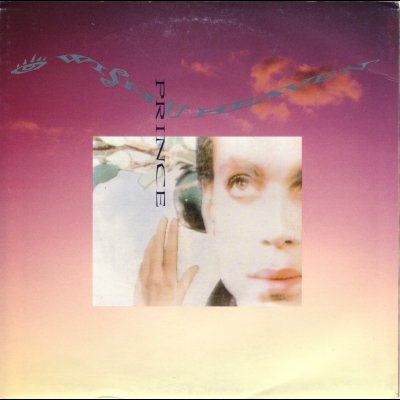
The emotional centerpiece of the album – and widely regarded as one of the finest moments of Prince’s entire career – is side one’s epic closer, “Anna Stesia.” Prince has often straddled the line between sexuality and spirituality in his music, trying to marry love of God with the ecstasy of sex. “Anna Stesia” is the ultimate expression of this tension. It opens with a simple, bare piano pattern, with Prince tunelessly asking himself, barely above a whisper, “Have you ever been so lonely that you felt like you were the only one in this world? Have you ever wanted to play with someone so much you’d take anyone, boy or girl?” Then the song slowly builds, over a languid bass line and complex vocal arrangement, with flourishes of keyboard and guitar, to a stunning climax of choral voices repeating “Love is God, God is Love, girls and boys love God above.” It’s an arrangement of impeccable precision and beauty, an astonishing creation that is rightfully regarded as one of Prince’s career pinnacles. The arrangement and production are genius, and Prince delivers it with an intensity and sincerity rarely heard in his recorded output. It’s hard to listen to the vocal arrangement during the line “We’re just a play in your master plan, now my Lord I understand” without feeling chills. Songs like “Anna Stesia” are why Prince is universally regarded as a musical genius.
Side two begins with “Dance On,” which thematically is a bit of a hybrid between “1999” and “Sign o’ The Times” – the world is going to shit, so we may as well party – built over a complex and funky drum pattern played by Sheila E, who also provides backing vocals. “Dance On” is one of the more straightforward tracks on the album, and although it covers familiar lyrical territory it might have been an interesting choice as a single. From there we go to the title track, one of the more sonically adventurous tracks of Prince’s career. An up-tempo rocker built around a strong synth line and guitar riff, “Lovesexy” is a marvel, and ties together the concept of love/sex/God along with the recurring Princely theme of the masculine/feminine duality within each of us. In one of the most exciting segments of the album (beginning with “tonight, we make love with only words”), during the climax of “Lovesexy,” Prince has a conversation with himself as a man and a woman using vocal manipulation, speeding up and slowing down as needed, to brilliant effect. Nobody but Prince could make a line like “You want me to swivel in your love seat, don’t you baby?” so brazenly sexual. Had it not been for the somewhat overly sexual subject matter and unusual title, “Lovesexy” would have been a terrific single for sure. “This feeling’s so good in every single way!” The joy in the song is palpable, as it is throughout most of the album.
There is one holdover from “The Black Album,” and that is the ballad “When 2 R In Love.” It fits far more naturally among the generally more uplifting “Lovesexy” album than the lascivious funk of “The Black Album,” so it’s a welcome addition. “When 2 R In Love” is one of Prince’s loveliest ballads, with a gorgeous falsetto vocal and the repeated refrain “come bathe with me”. The track is sexual and comic (“the speed of their hips can be faster than a runaway train”) but also sublimely romantic; a marriage of animal sexual instincts with devoted passion (“Nothing’s forbidden, nothing’s taboo, when the two are in love.”) “When 2 R In Love” was also probably too racy to have been a single, which is a shame because it’s one of the more obviously commercial tracks on the album from a melodic standpoint. It would have been a major hit at R&B radio without question.
“Positivity”… Yes. The album closes with the epic “Positivity,” a slow-grooving funk epic that stretches over 7 minutes and gives the album the grand finale that it requires. Prince growls in his lower register about escaping poverty and a life a crime – and avoiding the clutches of “Spooky Electric” – through education and spiritual enlightenment. It’s an absolutely beguiling, hypnotic track, and a fitting end to an album that is exhilarating to hear. “Lovesexy” is bursting with ideas, melodies and sounds, and is utterly original from start to finish.
In some respects time has not been kind to “Lovesexy.” It’s remembered mainly by devoted Prince fans and critics, many of whom consider it the last chapter of his “Golden Years” – the stretch from 1980’s “Dirty Mind” through “Lovesexy” in 1988 when he produced a string of phenomenal albums that rank among the best in pop/rock history. Casual fans may know “Alphabet St.”, but that’s about it. Neither “Glam Slam” nor “I Wish U Heaven” have been included on any of his hits collections, and the videos are hard to find given Prince’s reluctance to allow any of his material on YouTube. Like all of his albums, no deluxe reissues have been released and, given his frosty relationship with Warner Brothers, reissues aren’t likely to appear anytime soon. Fortunately there are ways to hear the album in great sound quality. The original US CD still doesn’t have the tracks separated, but the European version does. The album sounds great on original vinyl for those who have turntables hooked up, and is easily found on eBay. And – best of all – there is a Japanese SHM-CD edition that was released several years ago that sounds absolutely phenomenal. It’s worth seeking out. “Lovesexy” is in some ways a forgotten album, but in time it will hopefully gain more recognition as the important work that it is. It’s utterly unique within Prince’s catalog, and in pop/funk/R&B music in general. It’s almost a genre to itself. An essential album that should be part of any Prince fan’s collection.
Support Metro Weekly’s Journalism
These are challenging times for news organizations. And yet it’s crucial we stay active and provide vital resources and information to both our local readers and the world. So won’t you please take a moment and consider supporting Metro Weekly with a membership? For as little as $5 a month, you can help ensure Metro Weekly magazine and MetroWeekly.com remain free, viable resources as we provide the best, most diverse, culturally-resonant LGBTQ coverage in both the D.C. region and around the world. Memberships come with exclusive perks and discounts, your own personal digital delivery of each week’s magazine (and an archive), access to our Member's Lounge when it launches this fall, and exclusive members-only items like Metro Weekly Membership Mugs and Tote Bags! Check out all our membership levels here and please join us today!





















